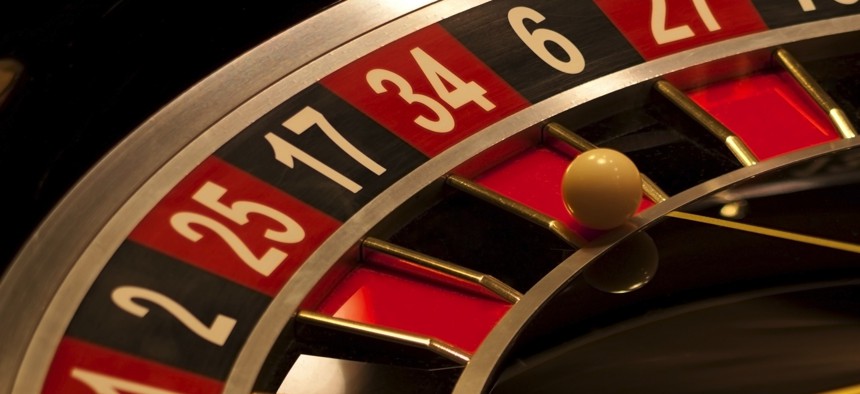As Pennsylvania Gambling Revenues Edge Upward, New Jersey Eyes More Casinos

Nata789 / Shutterstock.com
The regional casino market is crowded and Garden State lawmakers are pushing a North Jersey plan with hopes of helping Atlantic City, too.
Gambling industry revenues from slot machines and casino table games in Pennsylvania checked in at just over $253 million during November, marking a 2.4 percent uptick over the same month last year, according to the state’s Gaming Control Board.
The control board on Wednesday released November revenue figures for casino table games in the state. Slot machine income for the month was outlined in a report the board issued on Dec. 3. Over the last decade, Pennsylvania has carved out a fat place for itself in the Northeast's gaming sector, while neighboring New Jersey has seen its share of the industry erode.
In recent days, New Jersey lawmakers have unveiled proposals that would let the state’s voters decide whether to allow for two new casinos outside of Atlantic City. The gaming business in the city has been battered in recent years by the increasingly crowded casino market in the region.
The latest gambling revenue figures from Pennsylvania show that gross revenues from slot machines totaled $187,540,868 last month, whereas gross table game revenue for the industry in November was $65,579,697. Tax revenue from slot machines for the month was $100,209,876. From table games it was $9,325,617. Combined, the tax revenue totaled $109,535,493.

Table games include casino offerings like blackjack, craps and roulette.
Pennsylvania’s first slot parlor opened in November 2006. There are now a dozen casinos in the state. The Gaming Control Board reported this month that the average number of slot machines operating on a daily basis throughout Pennsylvania in November was 26,229, and that the average number of table games for the month was 1,159.
A report issued in July by the Center for Gaming Research at the University of Nevada, Las Vegas, showed that casinos in Pennsylvania raked in more commercial gaming revenue than any other Northeast state last year.

Figures from the Gaming Control Board pegged total industry revenues for the state’s 2014-2015 fiscal year at around $3.1 billion. That’s compared to 2006, when Pennsylvania’s casino industry was nascent, and revenues were a paltry $31.5 million.
In New Jersey, the UNLV report shows that commercial gaming revenue dropped to about $2.7 billion in 2014, down from $5.2 billion in 2006.
Garden State Double-Down?
Last Friday, New Jersey state Senate President Stephen M. Sweeney, a Democrat, announced that he had introduced legislation that would call on voters to decide whether to allow for two new casinos in the northern part of the state. Voter approval would be needed because allowing for the new casinos would require amending provisions in New Jersey’s constitution, which currently limit casino gaming to Atlantic City.
For the initial 15 years under Sweeney’s proposal, 49 percent of the money flowing to the state would go toward assisting Atlantic City with its finances. After that time, the percentage would decline by 3 percent annually until hitting 19 percent.
On Monday, state Assembly Speaker Vincent Prieto, also a Democrat, unveiled legislation similar to Sweeney’s. But it would dedicate only 35 percent of revenues to Atlantic City.
Atlantic City saw four of its 12 casinos close last year, amid increased competition from not only Pennsylvania, but from new gaming venues in other nearby states as well. There are now about 50 casinos operating between Maryland, Maine and western New York. And new casinos are in development in New York and Massachusetts.
Roughly 8,000 people lost their jobs in Atlantic City when the casinos there closed.
The city itself is also ailing financially, teetering on the edge of insolvency. Moody’s Investors Service affirmed its Caa1 rating of Atlantic City’s general obligation debt last Friday. This means the debt is considered to be speculative and subject to very high credit risk.
In affirming the rating, Moody’s pointed to unsettled casino tax appeals, increased competition from new casinos in the surrounding region, and uncertainty over how the city would close its large structural budget deficit.
Lawmakers in New Jersey’s state Assembly are expected to vote Thursday on a financial assistance plan for the fiscally beleaguered municipality, which includes changes requested by Gov. Chris Christie, who is also a contender in the Republican presidential primary.
Sweeney believes his proposal to allow for the two new casinos in northern New Jersey would help to shore up Atlantic City’s finances, and benefit the state in other ways.
“Expanding gaming to North Jersey is the best way to revitalize an industry that is important to the state’s economy so that we can compete with neighboring states, generate the revenue needed to revive Atlantic City and contribute to economic growth,” he said in a statement.
Prieto, the Assembly speaker, in a statement about the legislation he has backed, said of casinos: “I've always advocated for them, because the State of New Jersey needs revenues.”
RECENTLY on Route Fifty:
Bill Lucia is a Reporter for Government Executive’s Route Fifty.
NEXT STORY: How Georgia Reorganized All Its Parks and Rec Data in 9 Months






